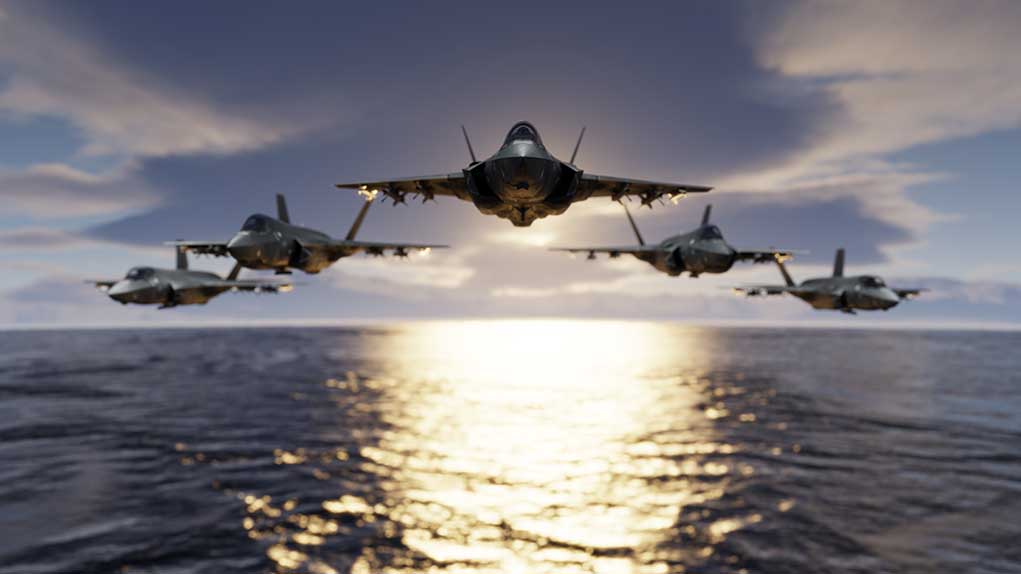
Britain has initiated urgent talks to purchase American fighter jets capable of launching nuclear weapons for the first time since the Cold War, radically expanding its deterrence capabilities against Vladimir Putin’s Russia.
Key Takeaways
- Britain is pursuing American-made F-35A Lightning stealth fighter jets capable of carrying B61 thermonuclear gravity bombs to counter increased Russian nuclear threats
- This acquisition would add a second pillar to the UK’s nuclear deterrent, complementing its submarine-based Trident missile system
- Defence Secretary John Healey and Admiral Sir Tony Radakin are leading the initiative with Pentagon involvement and Prime Minister support
- The move aligns with Britain’s upcoming Strategic Defence Review and planned increase in defense spending to 2.5% of GDP by 2027
- The UK would likely use American nuclear weapons under NATO’s nuclear-sharing arrangements, allowing for tactical nuclear response options
Britain’s Nuclear Response to Putin’s Aggression
Britain’s defence establishment is pursuing American-made fighter jets capable of delivering tactical nuclear weapons in a significant shift of military strategy. Defence Secretary John Healey and Admiral Sir Tony Radakin, Chief of the Defence Staff, are spearheading discussions with the Pentagon to acquire F-35A Lightning stealth fighter jets that can launch lower-power gravity bombs. This acquisition would represent the first air-deliverable nuclear capability for Britain since it retired its WE.177 free-fall nuclear bombs in 1998, ending the RAF’s nuclear role.
“The world is definitely becoming more dangerous. Nuclear risks are rising. We face now, for the first time since the end of the Cold War, seriously increasing risks of state-on-state conflict,” said John Healey, Secretary of State for Defence.
The F-35A Lightning, manufactured by Lockheed Martin, has already been ordered by Germany for similar purposes and can carry the B61 thermonuclear gravity bomb from the US nuclear arsenal. With a range exceeding 1,350 miles and capacity to carry up to 18,000 pounds of ordnance, these advanced jets would significantly enhance Britain’s strategic capabilities. Under NATO’s nuclear-sharing arrangements, Britain would likely use American nuclear weapons rather than developing its own air-deliverable warheads.
Strategic Shift in Nuclear Deterrence
Britain currently relies exclusively on its Trident nuclear system, deployed via Royal Navy Vanguard-class submarines. The addition of air-launched capabilities would provide military planners with more flexible response options to scenarios short of full-scale nuclear war. This dual-pillar approach represents a significant evolution in Britain’s nuclear posture, directly responding to increased threats from Russia under Vladimir Putin’s increasingly aggressive foreign policy.
“Years of strategic neglect have left our forces stretched thin and limited in size. We are underprepared to respond to the worsening global threat environment, and in particular to meet the very real and growing threat from Russia,” said Lord De Mauley.
While the Ministry of Defence has not publicly confirmed the purchase, Healey has not ruled it out, stating: “Those sort of discussions are not conducted in public and certainly not with a running commentary.” He emphasized that “For nearly 70 years, our U.K. nuclear deterrent has been the guarantor of our U.K. security—it’s what Putin fears most.” The strategic shift has gained cross-party support, with Shadow Defence Secretary James Cartlidge endorsing the diversification of nuclear delivery methods.
Rearmament and NATO-First Strategy
The fighter jet acquisition aligns with Britain’s upcoming Strategic Defence Review 2025, set to be published Monday. Prime Minister Keir Starmer has committed to increasing the defense budget to 2.5% of GDP by 2027, reflecting the administration’s recognition of escalating global threats. The review is expected to emphasize a “NATO-first” defense policy and substantial rearmament, addressing concerns about Britain’s current military limitations in the face of Russian aggression.
“I recently called for our deterrent to be strengthened by diversifying how we deliver nuclear weapons, so I welcome the commitment to reintroduce air-launch capabilities,” said James Cartlidge, Shadow Defence Secretary.
This strategic shift arrives as tensions with Russia remain high following years of aggressive posturing and the ongoing conflict in Ukraine. The move also strengthens Britain’s commitment to NATO’s collective defense structure, with Healey emphasizing that “a country’s armed forces are only as strong as the industry that stands behind them.” Britain’s pursuit of nuclear-capable fighter jets signals a clear message to Moscow that NATO allies are prepared to modernize their deterrence capabilities in response to Russian threats.

















